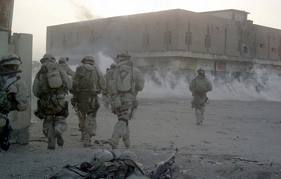American journalism was once widely known as the Fourth Estate, an elite sector of American society responsible for keeping an eye on the government and helping to inform the citizenry.
Now more commonly known as members of The Media, U.S. journalists walk a very fine line. Despite the necessity of a free press to serve as a bulwark of democracy, Americans are virulently skeptical about elites. There is little love for the fat cats of corporate boardrooms, political power mongers, ivory tower dwellers, or an arrogant know-it-all of any ilk.
It is hard to imagine a more public enterprise than journalism, but it is amazing how little the public knows about the inner workings of the Fourth Estate. In the spirit of benevolent know-it-allism, here is a glimpse of the newsroom's secret society:
- Headlines are the high art of journalism, whether they appear in print, online, television graphics, or at a radio broadcast's "top of the hour." The best headlines are promotional without overselling. Headline writing is a mysterious craft. The masters of this art are nameless and faceless editors, not the reporters seen on the street or working the phone gathering the news.
- Prior review of news stories has always been rare and is nearing extinction. Allowing people who serve as sources of news to review a story before publication or broadcast is a cumbersome process. When gathering news, a reporter assembles notes, video footage or audio snippets into a story format, then at least one editor massages the material into a final form. For prior review to be meaningful, it must occur after the editing process. One of the harsh realities of journalism is that only the most financially successful news magazines have the time and resources to accommodate prior review.
- Deadline pressure is intense in news media organizations. The sense of urgency is at least two-fold: avoiding the possibility of a competitor beating you to the punch and the fundamental truth that the best news is new not stale. As is the case in any industry, deadline pressure is one of the prime drivers of media errors.
- In America, journalism is a business, particularly if a news media organization produces quality content. Even in the blogosphere, which has been a democratizing force for the Fourth Estate, production of high-quality journalism is a high-cost venture. The public rightfully gravitates toward expertise and eye-catching presentation when consuming news. Expertise requires formal education or years of experience, neither of which comes cheap in America. Attractive presentation requires a knowledge of design and mastery of technology, which also come with a price.
- Story selection is a constant source of consternation in the public, but it reflects one of my best friend's favorite adages: be care what you ask for, you just might get it. Editors have always known sex and violence sells. With the rise of the Internet as a journalism medium, now editors have data that shows conclusively the kinds of stories that draw the public's interest. There are media outlets that consistently present important stories about government policy and community affairs, but there are many more that pander to prurient page clicks.
- Trust is the secret sauce of journalism. Reporters have to establish a level of trust with their sources to gather information that is often sensitive in nature. Editors have to trust their reporters are gathering accurate information and representing it truthfully. The public is best served when it can turn to trustworthy news organizations for information that affects individuals, families, communities and the country.























